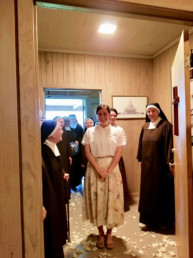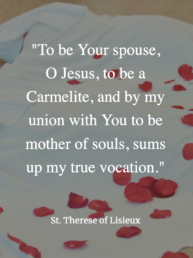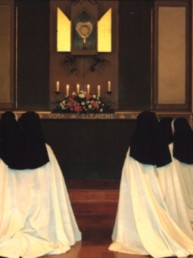God calling?
The Vocation of the Carmelite Nun
“The vocation of Carmel in the Church, and the particular form of life which St. Teresa began and gave witness to, require of those, who, in response to God’s call wish to embrace it that they pledge themselves to follow with firm determination and ‘with every possible perfection’ the evangelical counsels. They do this for the Church in its needs in a small community which is rooted in solitude, prayer and self-denial” (Constitutions #131).



The Latin root of the word vocation means “to call” or “to summons”. There are many callings in life that are more familiar: the natural vocation to marriage, the vocation of teaching, nursing, etc. However, when we speak of a vocation to the religious life (or the priesthood) it’s important to understand that this is a divine vocation and a divine call. This presupposes a divine initiative to which we respond– “Fiat”, “be it done unto me”, said the Blessed Virgin Mary. All the baptized have received a call or divine vocation to live the Christian life, but not all are called to live the vocation of the consecrated religious life.
Typically, when a young woman knocks at the monastery doors with a genuine vocation, there are three signs that stand out: persistence, immediacy and decision.
Persistence in regards to God’s call: After some time and sincere prayer, the Lord continues to place the vocation upon one’s heart. The thought of it or the desire for it, consistently springs up. Other plans and dreams seem to fall away.
Immediacy: After recognizing Jesus’ call, there is usually a certain urgency to follow and respond. “The love of Christ impels us” (2 Cor. 5:13).
Decision: Once the divine call is received, there is a strong determination and decision within the person that remains. It is the divisiveness that is capable of making a radical choice and life changing decision: “to leave father and mother, brother and sister” and to “come, follow Me.”
If you have ever listened to religious or priestly vocation testimonies, you will soon discover that everyone’s story is different. God’s call and timing are unique and personal–our vocation is a mystery. For some, the call comes at an early age, for others during their high school years, and still others later. The means by which Our Lord’s call might come to us also vary from one to another.
The key to discernment is prayer, a prayer that is a deep listening of the heart in complete openness to God’s plan. Speaking to a spiritual guide or friend can be very enlightening, especially in the beginning. It is the Lord who calls and the Lord who chooses us for a specific vocation: either to the contemplative or active life, and even to a specific charism and community.
Contacting a community and visiting them is usually the first step to begin the process of discernment. Some questions you might ask yourself: Where is the Lord leading me? To which community am I drawn? Do I feel at home or at peace there? Does their specific charism resonate with me? Speaking with the Vocational Director or Novice Mistress of a community can often be very revealing to knowing if this is the place or community for me.
The contemplative vocation of seeking the face of God in a hidden life of prayer has existed since the earliest years of the Church’s history. Over the centuries the Holy Spirit has enriched the Church with a variety of charisms.
The vocation of a Discalced Carmelite Nun is the call to a contemplative life of prayer on behalf of the Church and the world, lived out in a small community. Enclosure aids us in providing that space set apart for the encounter with God. Teresian joy fills our cloisters. Together we seek union with God through love, that will enable us to become true spiritual mothers. For more on our charism, see here.
Which Carmel? The first thing to do is to contact and correspond with a community you feel drawn to. Visiting the monastery and community in person is often the “eureka” moment. Do you feel at home? Is there a certain peace that comes to you about this community?
*A genuine call to Carmelite life
*A joyous spirit of generosity and love
*Good moral, physical and psychological health
*Age limit: 35
*Freedom from obligations to others (debts, dependents, etc.)
“Candidates to the Order should be persons of prayer who aspire to the perfection of charity and to detachment from the world, so that they may be able to embrace the Discalced Carmelite way of life, in which a deeply solitary communion with God is closely united to sisterly life together in community” (Constitutions #132).
Vocation Inquiry
